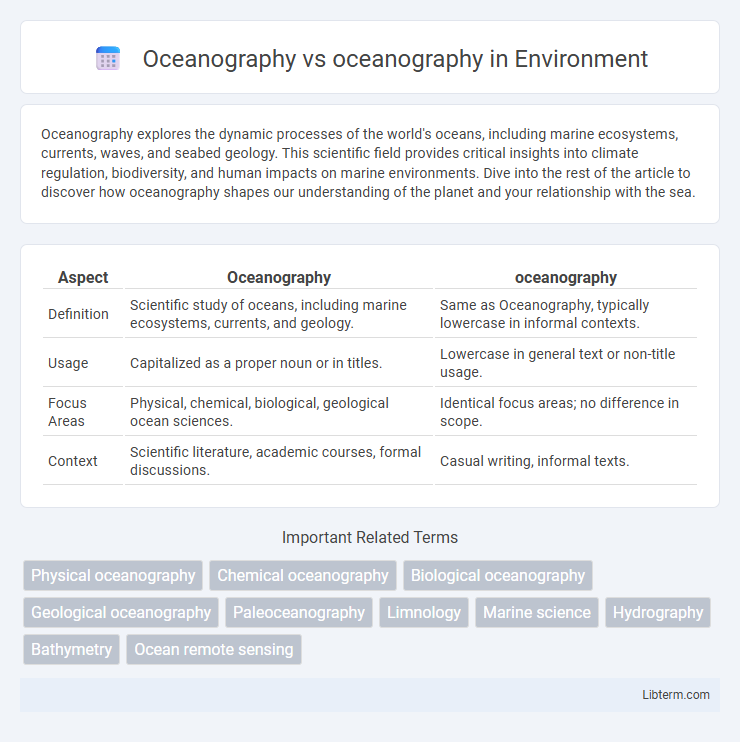Oceanography explores the dynamic processes of the world's oceans, including marine ecosystems, currents, waves, and seabed geology. This scientific field provides critical insights into climate regulation, biodiversity, and human impacts on marine environments. Dive into the rest of the article to discover how oceanography shapes our understanding of the planet and your relationship with the sea.
Table of Comparison
| Aspect | Oceanography | oceanography |
|---|---|---|
| Definition | Scientific study of oceans, including marine ecosystems, currents, and geology. | Same as Oceanography, typically lowercase in informal contexts. |
| Usage | Capitalized as a proper noun or in titles. | Lowercase in general text or non-title usage. |
| Focus Areas | Physical, chemical, biological, geological ocean sciences. | Identical focus areas; no difference in scope. |
| Context | Scientific literature, academic courses, formal discussions. | Casual writing, informal texts. |
Defining Oceanography: Uppercase vs. Lowercase
Oceanography with an uppercase "O" typically refers to the formal academic discipline or scientific field that studies the physical, chemical, biological, and geological aspects of the oceans. In contrast, oceanography with a lowercase "o" generally denotes the practice or general study of ocean-related phenomena without specifying the formal discipline. Proper usage depends on context, emphasizing that "Oceanography" signifies the field as a recognized science, while "oceanography" indicates the broader, informal exploration of ocean topics.
Historical Evolution of the Term "Oceanography
The term "Oceanography" historically emerged in the mid-19th century, reflecting its formal recognition as a scientific discipline, whereas "oceanography" in lowercase denotes the general study of oceans. Early usage of "Oceanography" capitalized the term to emphasize its comprehensive scope, encompassing physical, chemical, biological, and geological aspects of marine environments. The evolution of the term mirrors advancements in marine exploration and technological innovations, leading to its standardized use in academic contexts by the 20th century.
Academic Perspectives: Capitalization Significance
The capitalization of "Oceanography" often signifies its use as a formal academic discipline or course title, distinguishing it as a specialized field of study within the Earth sciences. In contrast, the lowercase "oceanography" generally refers to the broader scientific study of the ocean's physical, chemical, biological, and geological properties without emphasizing its institutional context. This distinction highlights the importance of capitalization in academic writing to convey specific meaning and hierarchical status within educational programs and research disciplines.
Proper Nouns vs. Common Usage in Scientific Contexts
Oceanography refers to the proper noun used in titles, organizations, or specific studies, such as the "Journal of Oceanography" or the "International Oceanography Association." In contrast, oceanography as a common noun denotes the general scientific discipline studying ocean processes, marine ecosystems, and physical, chemical, and geological ocean features. Distinguishing between proper and common usage ensures precise communication in academic papers, research documentation, and educational materials within marine science.
Oceanography as a Field of Study
Oceanography as a field of study encompasses the scientific exploration and analysis of oceanic phenomena, including marine ecosystems, ocean currents, and geological ocean structures. It integrates disciplines such as biology, chemistry, physics, and geology to understand ocean environments and their impacts on global climate systems. Research in Oceanography supports advancements in environmental conservation, natural resource management, and climate change mitigation.
Institutional and Journal Naming Conventions
Oceanography with a capital "O" is typically used in institutional and journal naming conventions to denote formal entities such as the journal "Oceanography" published by The Oceanography Society or the "Institute of Oceanography." Lowercase "oceanography" refers to the scientific discipline studying the physical, chemical, biological, and geological aspects of the ocean. Proper capitalization in titles and names helps distinguish formal institutions and publications from the general field of study, ensuring clarity and professionalism in academic and scientific communication.
Oceanography vs. oceanography in Educational Materials
Oceanography in educational materials refers to the formal scientific study of the oceans, encompassing disciplines such as marine biology, chemistry, physics, and geology, often capitalized when denoting the academic field or course title. In contrast, oceanography in lowercase generally describes the broader, informal understanding or general content about ocean studies found in textbooks, articles, or educational resources. Differentiating between Oceanography and oceanography ensures clarity in curriculum design, academic research, and resource classification within educational contexts.
Search Engine Optimization: Title Case Effects
Using Title Case ("Oceanography") in SEO enhances keyword prominence and improves click-through rates by aligning with search intent and user expectations, as capitalization signals importance to both users and search engines. Lowercase "oceanography" may reduce visibility in competitive search queries where proper nouns and academic subjects are often capitalized, potentially lowering ranking potential. Consistently applying Title Case in page titles, meta descriptions, and headers optimizes on-page SEO and boosts relevance for educational and scientific search queries.
Reader Perception: Capitalization Impact
Capitalizing "Oceanography" signals a formal, academic discipline, enhancing reader perception of authority and specificity, while "oceanography" in lowercase typically conveys a general scientific field or casual reference. This distinction influences how readers interpret the importance and context, with capitalization often reserved for proper nouns like department names or course titles, thereby emphasizing professionalism and expertise. Careful use of capitalization in this context guides reader engagement and the perceived credibility of the content.
Best Practices for Writers Discussing Oceanography
Writers discussing oceanography should differentiate between the capitalized term "Oceanography," which refers to the scientific discipline, and the lowercase "oceanography," denoting general study or topics related to oceans. Best practices include using "Oceanography" when referring to formal academic fields, institutions, or courses, enhancing clarity and professionalism in scientific writing. Incorporating precise terminology and contextual relevance improves search engine optimization and reader engagement within marine science content.
Oceanography Infographic

 libterm.com
libterm.com